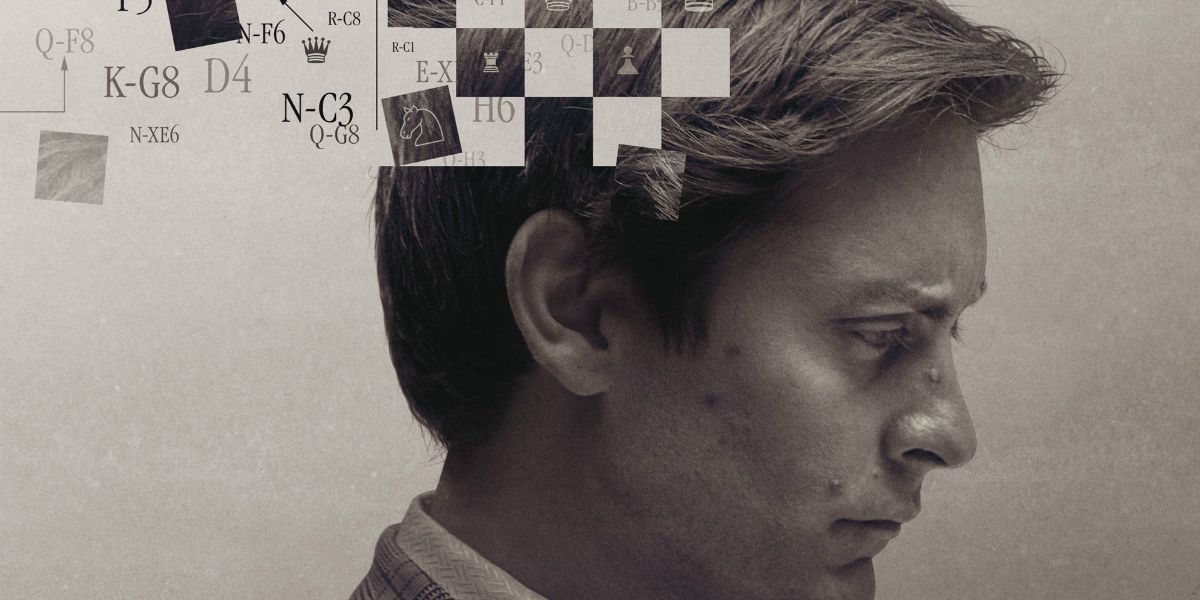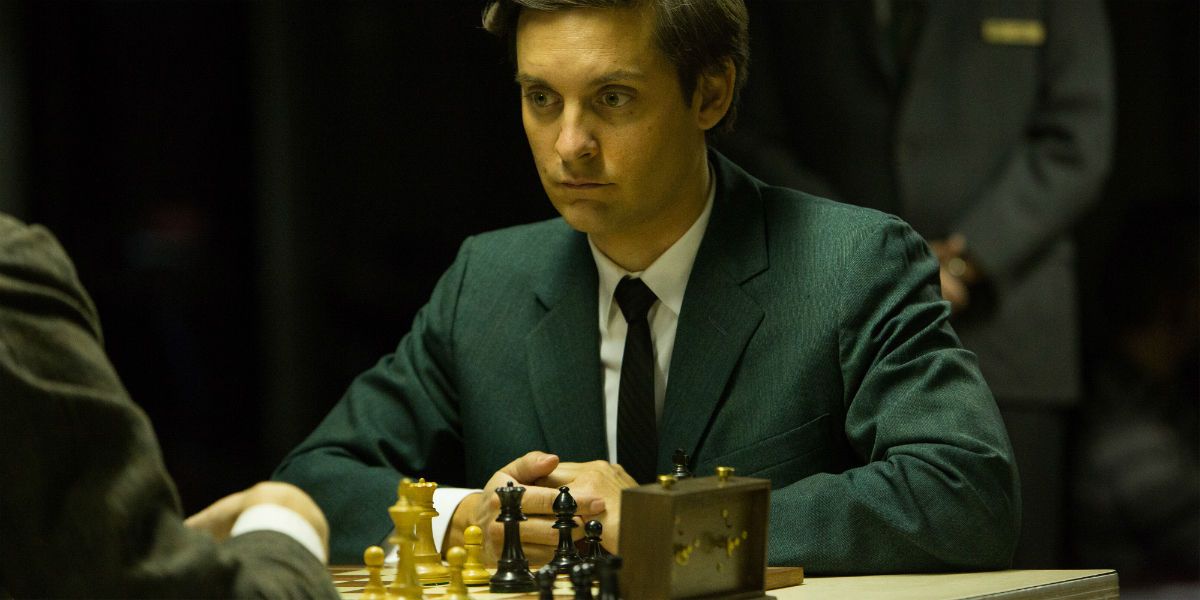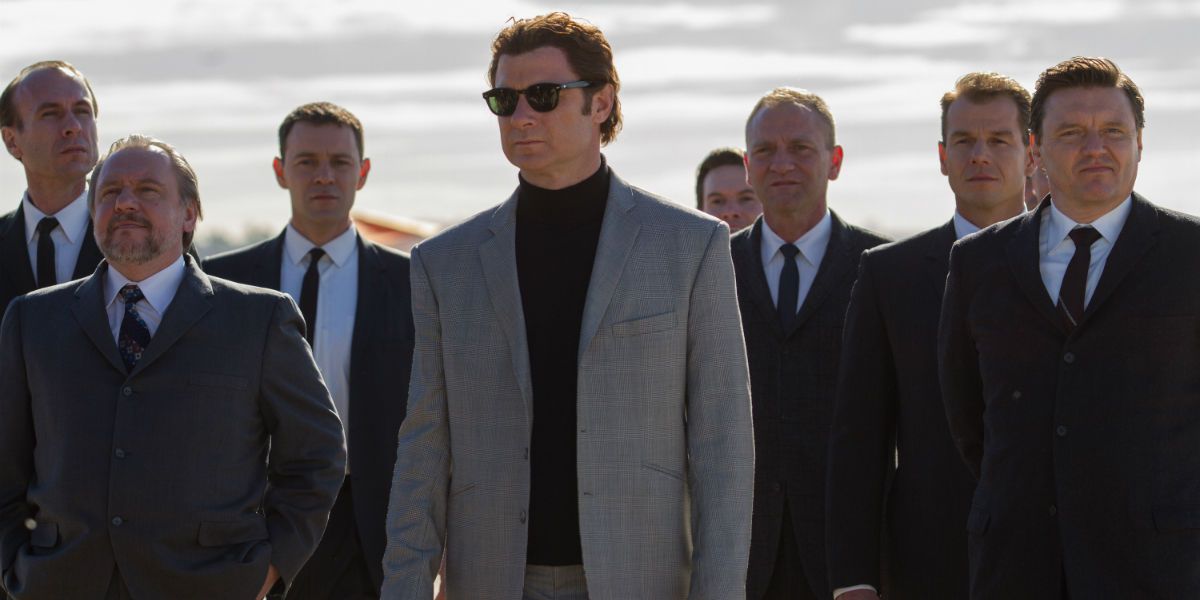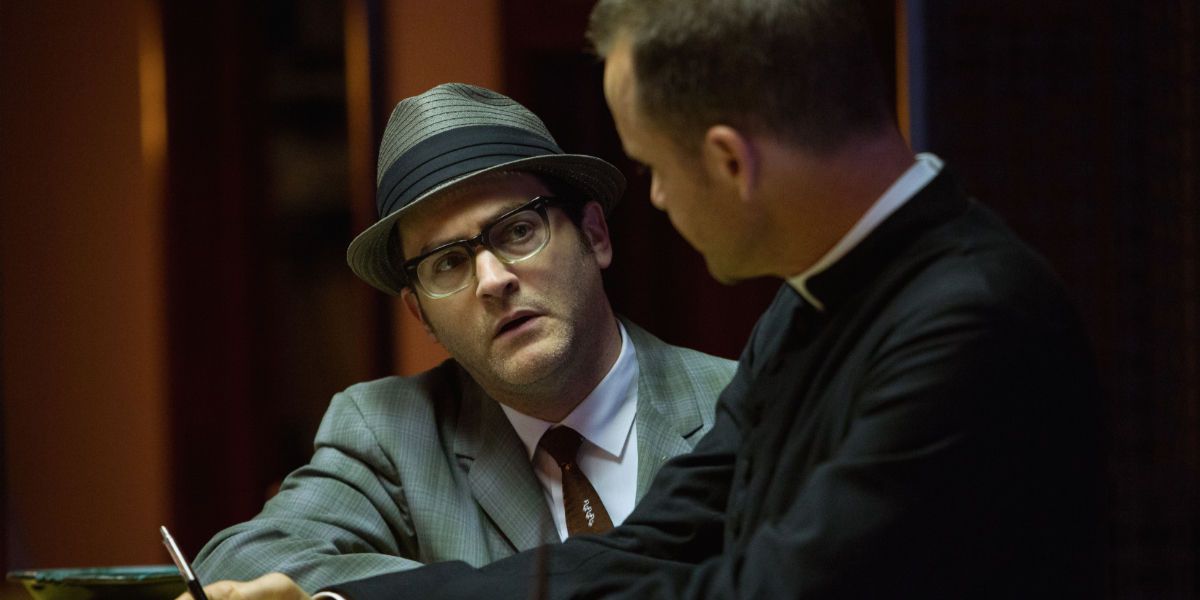Pawn Sacrifice is an engaging and well-made biopic with solid performances, but fails at being an insightful and thematically rich work of cinema.
Pawn Sacrifice begins in the early 1950s, when Bobby Fischer is a young boy growing up in Brooklyn and teaching himself how to play chess. Bobby, under the guidance of chess expert Carmine Nigro (Conrad Pla), quickly ascends to the rank of youngest Grandmaster ever, participating in both U.S. and World Championship chess competitions during his teens. However, as he matures into both a master chess player and grown man, Bobby (Tobey Maguire) becomes increasingly outspoken and eccentric - to the point of simply being erratic in his behavior - putting him at odds with the chess community and the world at large.
Bobby is eventually approached by Paul Marshall (Michael Stuhlbarg), a lawyer who offers to support Bobby in a campaign against the Soviet Union's chess team - including world-famous Russian player Boris Spassky (Liev Schreiber) - with assistance from chess master and Catholic priest, Father William 'Bill' Lombardy (Peter Sarsgaard). As time goes on, though, his close aquaintances and family start to realize it's less a question of whether or not Bobby can beat Spassky - and more a question of whether or not Bobby will be defeated by his own madness, first.
Directed by Oscar-winner Edward Zwick (Glory, The Last Samurai), Pawn Sacrifice is a very handsome and visually well-crafted addition to the biopic genre, thanks in no small part to the combined efforts of Zwick and director of photography Bradford Young (Selma). The movie relies heavily on the usage of carefully designed close-up shot compositions, which are cleverly edited together by Steven Rosenblum (Zwick's frequent collaborator) in a way that successfully captures the immediacy and intense nature of the most dramatic beats in the film's story - be they terse chess matches or sequences where Bobby's slide towards insanity picks up speed (as he's overtaken by paranoia and his obsessive mindset). While Pawn Sacrifice isn't equally strong in terms of production design, it succeeds at pulling you into Bobby's world purely on a sensory level - making the simple act of playing chess fittingly "cinematic".
Tobey Maguire anchors the proceedings with a compelling turn as Bobby Fischer, bringing the right mix of charisma and off-kilter awkwardness that Pawn Sacrifice's portrayal of the chess master calls for. Maguire is further able to hit the right notes when it comes to capturing Fischer's disconnect from the people and places around him (without overplaying those notes), while at the same time blurring the line between when Bobby is in a state of intense concentration... or when he's just becoming unhinged. The film's suggestion that brilliance and madness are difficult to tell apart (especially when it concerns a Bobby Fischer type) isn't the most original idea, but Maguire demonstrates it well with his work here.
Still, Pawn Sacrifice falls short in being an insightful historical drama or personal memoir. The film creates a sense of what it feels like to be Bobby Fischer; yet, by the end he remains as much a mystery to us as he is to the movie's supporting characters - the latter primarily function as spectators present to witness Fischer's genius/lunacy, as opposed to being players in the story with fully-realized motives and interests of their own. Zwick also provides much of the social context for Pawn Sacrifice's narrative through either real or fake grainy archived news footage, so that important events from history are referenced - yet not in a way that thematically enhances the main narrative or adds layers of meaning to the significance of Bobby Fischer's actions (other than the obvious Cold War symbolism).
It's possible the script by Steven Knight (Eastern Promises, Locke) better fleshed out the supporting characters in Pawn Sacrifice at some point, allowing them to reflect the enigmatic Fischer and his effect on the world, at large. Boris Spassky, specifically, is partly set up as a foil to Mr. Fischer, but he doesn't get enough onscreen development to fill that role. Liev Schreiber delivers an appropriately understated and coiled performance as the chess maestro, suggesting that with perhaps a few additional scenes the character would have worked as the antithesis to Fischer. Indeed, the moments where Pawn Sacrifice shifts to Spassky as he climbs down the rabbit hole to try and guess what his opponent is thinking, are among its most intriguing, for related reasons.
Story threads in Pawn Sacrifice that concern supporting characters tend to feel a bit under-cooked (as was mentioned before), but the capable crew of actors who fill out the film's supporting cast help to make up the difference. Michael Stuhlbarg and Peter Sarsgaard both bring humanity to their respective roles in Pawn Sacrifice and make their respective characters relatable, while Lily Rabe (American Horror Story) and Robin Weigert (Deadwood, Sons of Anarchy) make the most of their limited screen time as Bobby's concerned sister Joan and mother Regina, respectively. Lastly, the film includes a few brief, but still memorable appearances by reputable movie/TV actors that some audience members will recognize (like Orphan Black's Evelyne Brochu).
Pawn Sacrifice is an engaging and well-made biopic with solid performances, but fails at being an insightful and thematically rich work of cinema. It covers several big events in Bobby Fischer's life, yet it doesn't find a way to dig below the surface of its (admittedly, complicated) protagonist. Similarly, as a look back at 20th Century history and Fischer's place in it, there's not much new here for those who are already familiar with the broader strokes of the story. Zwick's movie, on the whole, is a perfectly respectable docudrama (or, if you prefer, "Oscar Bait"), but those searching for a greater in-depth look at Fischer might want to check one of the previously-released film about his life instead (like the 2011 documentary Bobby Fischer Against the World).
TRAILER
Pawn Sacrifice is now playing in select U.S. theaters. It is 116 minutes long and is Rated PG-13 for brief strong language, some sexual content and historical smoking.
Let us know what you thought of the film in the comment section below.




